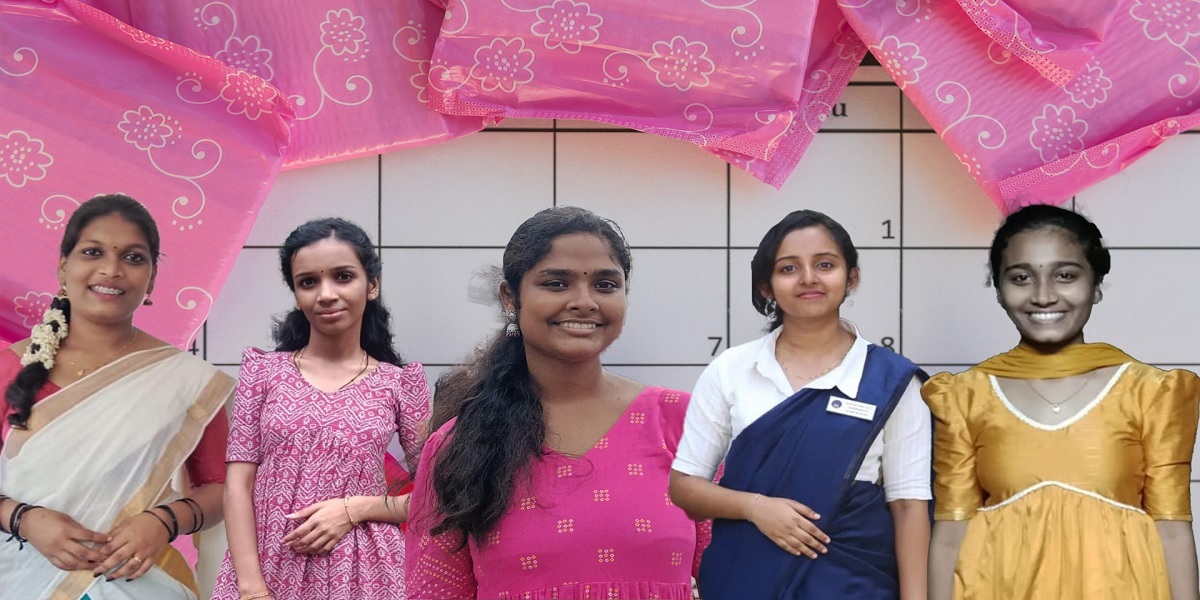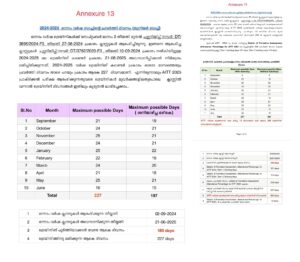Published Dec 05, 2024 | 9:00 AM ⚊ Updated Dec 05, 2024 | 9:00 AM

Are students in Kerala truly aware of the concept of menstrual leave? Are the promises and awareness programs genuinely benefiting them?
Anakha Sivakumar and Angitha Jasy — these may not be names commonly associated with the celebration of Kerala’s groundbreaking menstrual leave policy. Yet, it is these two young women who led the charge for this significant change.
Kerala has become the first state in India to grant menstrual leave to students in all state-run higher education institutions, a landmark decision that highlights the strength of women’s efforts in securing their rights and welfare.
Whether it is Kerala’s Channar Revolt, the nineteenth century movement that asserted the rights of women in the lower caste to cover their breasts, or Iran’s hijab protests, women have had to wage their own battles, to secure their rights.
Kerala General Education Minister V. Sivankutty recently extended the monthly menstrual leave policy to cover female students enrolled in Industrial Training Institutes (ITIs) as well. The Kerala government had announced the policy in January 2023, to cover state universities.
The journey of Kerala’s menstrual leave policy is fascinating, but a critical question remains — Are students in Kerala truly aware of the policy of menstrual leave? Are the promises and awareness programmes genuinely benefiting them?
Anagha and Angitha (enrolled at the College of Engineering, Trivandrum) took the initiative to raise the demand for menstrual leave, seeking a 2% attendance exemption for female students each semester.
They met with P.A. Indulal, additional private secretary to the Minister of Higher Education, R. Bindu, to present their case.
While waiting for a response, they conducted thorough research on the importance of menstrual leave and compiled a report with feedback from over 850 students at their college.
This report was personally submitted to Minister R. Bindu. Despite receiving no immediate action, Anagha and Angitha did not give up.
They expanded their campaign to other universities, engaging with student representatives and gaining widespread support. Eventually, their persistence paid off as the call for menstrual leave united students across the state.

Anagha and Angitha with Minister R.Bindu
Female trainees in ITIs will be granted two days of menstrual leave each month, acknowledging the physically demanding nature of skill-training programmes, particularly in traditionally labour-intensive trades where women are now excelling.
This initiative will be implemented across over 100 ITIs in Kerala, benefiting a large number of female students.
However, the KSU student unit at the Kannur Government ITI is planning a strike on 4 December to protest the accompanying time change introduced.
Muhammed Ribin, first-year Welder student and the KSU unit president of Kannur ITI, told South First, “While the menstrual leave policy is beneficial for female students, the revised shift timings in ITIs are unacceptable.”
The new timing schedule is not feasible. Previously, the first shift ran from 7:50 am to 3:00 pm, and the second shift from 10:00 am to 5:00 pm.
The revised circular now states that the first shift will start at 7:30 am and end at 3:00 pm, while the second shift will run from 10:00 am to 5:30 pm.
This adjustment results in students being required to complete 1,200 hours during their course, but the new hours extend to 1,700 or even 1,900 hours.
This increase in hours is unnecessary, especially since there is already little syllabus coverage in ITI programmes.

ITI Training Calender
This change leads to significant health issues among students, including girls. Many students at ITIs come from underprivileged backgrounds and have to work after class hours. First, these issues need to be addressed.”
Nanditha Gopi, a second-year Instrument Mechanical student at Kannur ITI, told South First, “We learned about the circular that allocates two days of menstrual leave each month to female students through media and student units on campus. However, it would be better if campaigns and awareness programs were conducted to inform girls about the importance of such policies. The HODs and teachers have not shared these updates in classrooms. We still have a long way to go to ensure equal access to this information for everyone.”

Nayana
Nayana, a student at CMS College Kottayam and a union member of the SFI, shared some serious yet under-discussed issues related to menstrual health.
While many students in Kerala’s schools and colleges have transitioned to more sustainable menstrual products, such as menstrual cups, eco-friendly tampons, and menstrual discs, some still choose to use cloth during menstruation. This choice is not driven by comfort or skin issues, but rather by religious beliefs.
Nayana told South First, “I personally know students who use cloth during their menstrual cycle solely because of their religious beliefs. I’ve tried multiple times to convince them and introduce new options, but they fear change, which is unfortunate.”
According to their religious beliefs, women must use specific clothes during menstruation, which are to be burned after use. Menstrual clothes should be kept away from snakes, as contact with them is believed to bring sarpa dosham (snake curse), potentially affecting marital life, fertility, and other aspects of well-being. Additionally, orthodox families often restrict women from using menstrual cups, fearing it may result in the loss of virginity.
Nayana also expressed her views on the menstrual leave policy, highlighting that most students are aware of it and the revised attendance percentage.
“The attendance requirement for girls, including menstrual leave, is 73%, while others need 75% to be eligible for university examinations. On our campus, these topics are widely discussed, and student unions have made efforts to raise awareness about menstruation and the leave policy. However, the university and management still fall short. Teachers have not started addressing these issues in the classroom. It would be beneficial if more awareness campaigns were organised to reach a wider audience and emphasise the importance of these benefits,” she said.

Parvathy
Parvathy Krishna V M, a second-year economics student at Assumption College Changanacherry, said, “I’m familiar with the menstruation leave policy. I have seen news reports. Many of my peers have taken time off due to menstrual discomfort. Unfortunately, this policy receives minimal coverage in the media and is still given limited space in newspapers.”
Parvathy said it would help if department heads and teachers communicated the information about this policy in classrooms and displayed circulars on notice boards.
“Even now, women students prefer to opt for sick leave instead of taking leave for menstrual reasons. I’m unsure why they hesitate to mention menstrual leave, even in women’s colleges,” Parvathy said, as her friend Namitha agreed.
Anagha Johnson, a second-year economics student at Assumption College Changanassery, said menstrual leave was a good idea, there is much physical and emotional discomfort during menstruation.
She noted that even if the leave is not widely taken, just having it would foster a supportive environment and allow women to prioritise good health.
Aparna Biju, admitted she was unaware of the menstruation leave policy. Learning of it, she agreed that it was a good idea.

Aparna
Sneha S, who is a second year Economics student, said she had come across discussion of the state’s menstruation leave policy on Instagram. She said it was important to normalise conversations around menstruation, so that women find what support they need, and do not think of the issue as taboo.
The office of the Minister of Higher Education, however, did not think that there was need for any awareness campaign on this issue. One official explained: “We don’t believe more awareness is necessary. Students will learn about it through media outlets, and discussions are already taking place on campuses. Creating awareness about this policy is not an immediate priority.”
(Edited by Rosamma Thomas)

